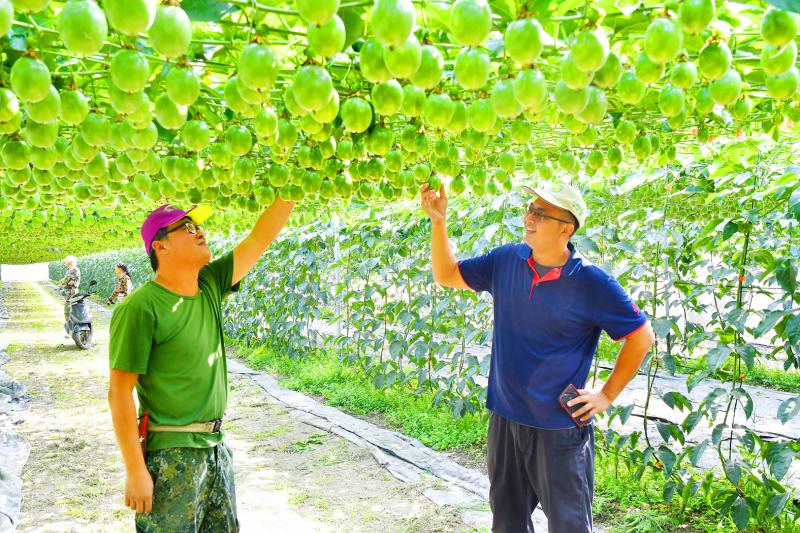Taiwanese will no longer have to wait until summer to buy passion fruit at local markets, thanks to lighting technology developed by a government-run agricultural technology research facility in southern Taiwan.
Passion fruit farming totals 809 hectares, including 604 hectares in Nantou County, mainly in Puli Township (埔里).
With the harvest lasting from July to September, the sweet seed-filled fruit is only available in markets from July to January the following year, the Council of Agriculture said.

Photo courtesy of the Kaohsiung District Agricultural Research and Extension Station via CNA
However, starting this year, the tropical fruit would be available all year, the council’s Kaohsiung District Agricultural Research and Extension Station told a news conference in Taipei on Tuesday.
Over the past three years, the station has instructed orchard operators in Kaohsiung, Tainan and Pingtung County on how to grow passion fruit in mesh houses, using artificial lighting as a substitute for sunlight, the station said.
Thanks to illumination adjustment technology developed by the station, and its know-how in orchard preparation and mesh house pollination techniques, passion fruit growers in the south are able to pick ripe fruit from February to June, before their counterparts in Puli begin their harvests in July, it said.
“Technological research and development allows Taiwan to harvest passion fruit even in the spring,” the station said.
An estimated 100 hectares of the new “spring passion fruit” have been planted in Kaohsiung and Pingtung, with an expected annual output of 2,000 tonnes, data from the station showed.
Growers of spring passion fruit begin to prepare the soil and plant seedlings in September and October, but with the aid of artificial lighting, they are able to harvest from February to June the following year, said Lee Wen-hao (李文豪), an assistant researcher at the research station.
This also ensures the harvest is not affected by typhoons and monsoon rainfall, which are most prevalent from July to September in Taiwan, he said.

Civil society groups yesterday protested outside the Legislative Yuan, decrying Chinese Nationalist Party (KMT) efforts to pass three major bills that they said would seriously harm Taiwan’s democracy, and called to oust KMT caucus whip Fu Kun-chi (傅?萁). It was the second night of the three-day “Bluebird wintertime action” protests in Taipei, with organizers announcing that 8,000 people attended. Organized by Taiwan Citizen Front, the Economic Democracy Union (EDU) and a coalition of civil groups, about 6,000 people began a demonstration in front of KMT party headquarters in Taipei on Wednesday, organizers said. For the third day, the organizers asked people to assemble

POOR IMPLEMENTATION: Teachers welcomed the suspension, saying that the scheme disrupted school schedules, quality of learning and the milk market A policy to offer free milk to all school-age children nationwide is to be suspended next year due to multiple problems arising from implementation of the policy, the Executive Yuan announced yesterday. The policy was designed to increase the calcium intake of school-age children in Taiwan by drinking milk, as more than 80 percent drink less than 240ml per day. The recommended amount is 480ml. It was also implemented to help Taiwanese dairy farmers counter competition from fresh milk produced in New Zealand, which is to be imported to Taiwan tariff-free next year when the Agreement Between New Zealand and

A woman who allegedly spiked the food and drinks of an Australian man with rat poison, leaving him in intensive care, has been charged with attempted murder, the Taipei District Prosecutors’ Office said yesterday. The woman, identified by her surname Yang (楊), is accused of repeatedly poisoning Alex Shorey over the course of several months last year to prevent the Australian man from leaving Taiwan, prosecutors said in a statement. Shorey was evacuated back to Australia on May 3 last year after being admitted to intensive care in Taiwan. According to prosecutors, Yang put bromadiolone, a rodenticide that prevents blood from

A Japanese space rocket carrying a Taiwanese satellite blasted off yesterday, but was later seen spiraling downward in the distance as the company said the launch attempt had failed. It was the second attempt by the Japanese start-up Space One to become the country’s first private firm to put a satellite into orbit, after its first try in March ended in a mid-air explosion. This time, its solid-fuel Kairos rocket had been carrying five satellites, including one from the Taiwan Space Agency and others designed by Japanese students and corporate ventures. Spectators gathered near the company’s coastal Spaceport Kii launch pad in Japan’s